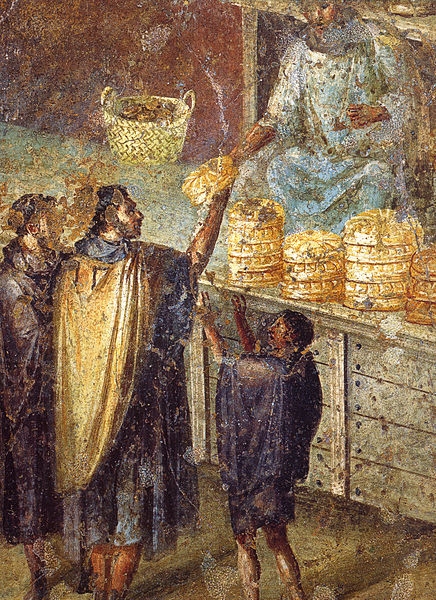Dr. Jacqueline Vayntrub (“Voice and Presence in the Genesis Apocryphon”) considers how the voice and agency of Sarai in the Genesis Apocryphon, an Aramaic text from Qumran, complicates our ideas about the authoritative first person voice in Second Temple Jewish texts.
Read More
Francis Borchardt and Eva Mroczek introduce the "alternative Festschrift" in Dr. Ben Wright's honor.
Read More
Nine contributors consider many facets of Ben’s scholarship on translation, authorial personae and voice, concepts of text and transmission, wisdom and the sage, and Jewish identity in the Hellenistic world.
Read More
If Gregory describes the aim or perfection of the Christian life as “never to stop growing towards what is better and never placing any limit on perfection,” how does mīmēis (Greek: imitation, representation) function within that endless pursuit?
Read More
Hilla Alouf's dissertation argues that "the Elijah traditions reflect the influence of not only the Torah-Centered wisdom tradition which viewed the law as the source of wisdom, but also the Apocalyptic-Centered and the Spirit-Centered wisdom traditions."
Read More
Sometime near the end of the fourth century, an anonymous scribe carefully read and revised the Ignatian epistles, extensively amending many of the letters and adding a few of his own in Ignatius’s name.
Read More
How do claims, explicit or implicit, about what animals are—and what they do, suffer, or feel—reflect assumptions about what people are? And what types of knowing engage animals?
Read More
Together the essays of this volume explore the themes of Scriptures and Sectarianism from a variety of lenses, ranging from close study of specific texts to broad assessments of scriptural authority and meaning-making in the Second Temple Period.
Read More
When viewed in conjunction with the wealth of pertinent biblical and ANE sources, the biblical law of bailment can tell us about a law in its many contexts, about divine justice and compassion, about the interactions of law with literature, about everyday life in ancient societies, and about the earliest articulations of a legal topic whose relevance has persisted into the modern era.
Read More
Ironically enough, at the time these stories, literally, made history, the catacombs for Jews remained "secret" and known to a minimal extent. Nevertheless, they, too, were seen as collective responses to ritual needs and distinctly Biblical traditions.
Read More
"Berns’ talk, and the seminar discussion, enabled reflection from an unexpected angle on the PSCO theme for the year: what does it mean for us to have expertise about what ancient Jews knew (and how they knew it)?
Read More
AJR will be sharing highlights from the Philadelphia Seminar on Christian Origins. This year's theme "science and the scientific" asks, "Does considering knowledge as practiced in the ancient world disrupt, modify, and nuance our understanding of the “scientific”?"
Read More
How did ancient scientists think about the ways plants fit into the larger cosmological order in relation to other ontological forms such as metals/minerals, animals, celestial beings, and other divinities?
Read More
Caroline Wazer, Lennart Lehmhaus, Chris De Wet, Julia Watts Belser, and Heid Marx examine aspects of ancient medicine from their own research.
Read More
Dr. Julia Watts Belser uses disability theory to read rabbinic narratives about the destruction of Jerusalem, identifying how "the disabled Jewish body serves both as a visceral occasion for lament and a potent site of protest against empire."
Read More
"What is intriguing about such statements as cited above—and one can list many similar cases with other authors—is that in them we witness how health, physiology, and anatomy are structured by means of social and cultural discursive formations. In this case, the discourse of slavery, which I have termed doulology,[iv] structures the dynamics between mental and gastric health. By their extension into the realm of the material psychē, these dynamics, in turn, shape the self. You are how you eat."
Read More
Dr. Lennart Lehmhaus shares a rabbinic case study in order to reflect upon the history of science and rabbinic texts: "A careful study of the discursive strategies and the embeddedness of such medical knowledge within their broader contexts of theology or religious law (Halakhah), allows one to highlight the differences in form and content in the variants of this narrative."
Read More
Dr. Caroline Wazer shares her work on Roman public health in the AJR forum on Ancient Medicine, concluding "that Roman ideas of what could and should be done in the interest of public health were more intimately connected to political climates than they were to the state of scientific knowledge, such as it was."
Read More
"When I asked what this emerging Christian food culture might have meant for the ordinary fourth century Christian, I found that it was not merely a trickle-down or oppositional model of lay vs. monastic or institutional piety. Rather, food helped early Christians negotiate among ideas across the spectrum of lived experience."
Read More
Carson Bay reviews Turning Proverbs towards Torah: an Analysis of 4Q525 by Elisa Uusimäki as part of our joint #Scrollsat70 celebration with @TWUDSSI.
Read More




![17th cent icon of Elijah and Enoch in Historic Museum in Sanok, Poland. Przykuta [Public domain], via Wikimedia Commons.](https://images.squarespace-cdn.com/content/v1/5449167fe4b078c86b41f810/1514987405965-Y10A3AY8PH8635QUSHX3/1024px-MHS_Eliasz_i_Enoch_XVII_w_p.jpg)










![Fig.: The yellow indicates the vagal nerve running from the nervous system to the stomach (from Gray’s Anatomy, plate 793; Wikimedia commons [public domain]).](https://images.squarespace-cdn.com/content/v1/5449167fe4b078c86b41f810/1506362512031-CY0T2K6AEF0K345F70S4/Untitled.jpg)


